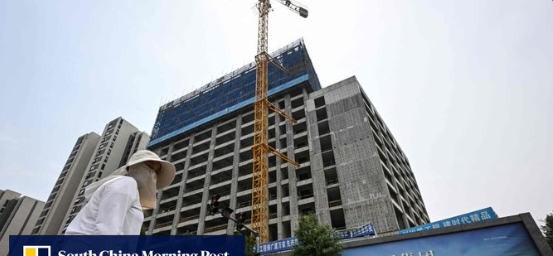Debt has nearly destroyed the Chinese market. As many have said, their market is all smoke and mirrors, and can collapse any day. If Trump were in the White House, right now thy would be collapsing
China is actively implementing measures to stabilize its troubled property market, a critical pillar of its economy that has recently shown signs of significant strain. Over the past week, various government departments have taken concrete steps aimed at revitalizing this sector, which at its peak contributed to a quarter of the country’s economic growth.
Chinese real estate stocks plunged 20% in half a month
On May 17 at noon, the Central Bank of China introduced three consecutive policies to boost the real estate market. These policies involved removing the lower limit on commercial housing interest rates, decreasing the… pic.twitter.com/SnOhayMUKq
— Spotlight on China (@spotlightoncn) June 11, 2024
The latest initiatives include a central bank meeting in Shandong province, focused on expediting the refinancing of low-income housing to help absorb excess inventory. This meeting was part of broader efforts to improve housing market efficiency and support a new development model for real estate in China. Cities like Jinan, Tianjin, Chongqing, and Zhengzhou shared insights from their pilot programs during this gathering.
Additionally, the Ministry of Natural Resources has issued a notice regarding the renewal of old communities. This measure is based on experiences from major cities like Beijing, Shanghai, Guangzhou, and Nanjing. It aims to enhance land use planning and coordination, strengthen policy support, and streamline the approval process.
Reversing deflationary climate in the midst of a significant real estate market shift is difficult. Stop spreading fake news! The major economic risk in #China in 2024 will still be the country’s real estate sector. #ChinaLies @softwarnet @WorldPowerPlay @thelouisbasuria 1/3 pic.twitter.com/ygtYdwwtg6
— Rashid Al balushi (@RashidAlba28263) June 16, 2024
Despite these efforts, a recent report by BBVA Research highlighted persistent weak market sentiments among households and businesses, pointing to the housing market as a primary risk to the Chinese economy. Dong Jinyue, a principal economist at BBVA, noted the difficulty in reversing a deflationary environment within the deep adjustments required in the real estate sector. According to him, real estate remains the principal economic risk for China in 2024.
The country has seen better-than-expected economic growth of 5.3% in the first quarter of the year, indicating resilience amid the real estate downturn and subdued domestic demand. Over the decades, real estate has grown to represent 25 to 30% of China’s GDP. However, the recent slowdown has seen developers struggling to deliver finished houses, leading to significant defaults on bonds worth more than 50 billion yuan ($6.89 billion) in 2022 alone, according to a report by French insurance company AXA.
“Rushes”? After 3 yrs, hardly.https://t.co/VDyXFfTfjt
— China Beige Book (@ChinaBeigeBook) June 16, 2024
In response to these challenges, the Chinese government announced new policies last month aimed at revitalizing the market. These include reducing the down payment ratios for first and second home purchases and adjusting mortgage rates. Additionally, a 300 billion yuan relending pool was established, and provisions were made for local governments and state-owned enterprises to purchase unsold land and housing from distressed developers. These measures represent China’s continued efforts to manage the risks and ensure stability within one of its most vital economic sectors. As long as they can continue to rob America of its intellectual property, and keep getting their best students educated in the U.S., China knows they can not only survive, but thrive. With President Biden in office, their bribed puppet, they know all bases are covered, and are expected to do all they can once again to fix the election in the U.S. in November.
Major Points:
- China is implementing policies to stabilize its real estate sector, a critical driver of its economy, by facilitating refinancing for low-income housing and optimizing land use.
- Recent government actions include a central bank meeting in Shandong to speed up housing refinancing, and a Ministry of Natural Resources directive to renew old communities.
- Despite these measures, analysts report ongoing weak market sentiment and identify the real estate sector as a primary economic risk for China in 2024.
- China’s real estate market has historically accounted for 25 to 30% of its GDP, but recent challenges have seen significant bond defaults by property developers.
- New government policies to support the property market include lowering down payment requirements for home purchases and establishing a 300 billion yuan relending pool to help distressed developers.
Al Santana – Reprinted with permission of Whatfinger News



